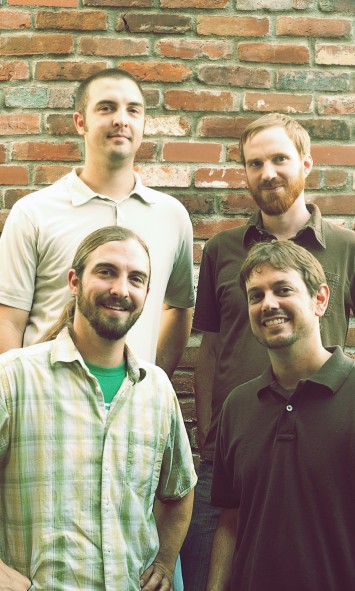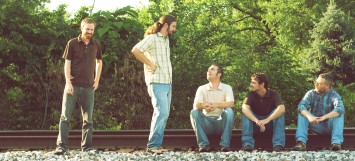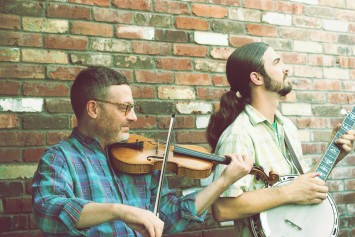social bookmarking tools:
 |
|
| Available RSS Feeds |
|---|
 - Top Picks - Top Picks |
 - Today's Music - Today's Music |
 - Editor's Blog - Editor's Blog
|
 - Articles - Articles
|
Add Louisville Music News' RSS Feed to Your Yahoo!
|

RELIC:
JUST DON'T ASK THEM TO WEAR MATCHING COWBOY HATS
By Tim Roberts. Photos by Laura Roberts
It's a warm, mid-September Saturday in 1984. I'm one month home after finishing the coursework for my M.A. in English at Morehead State University, unemployed, living with my family, still emotionally and mentally exhausted from the previous year: first time teaching English to college freshmen; the reading and research for a thesis on the development of the detective story that produced multiple drafts of half-assed assertions and strings of quotes from others' books; cramming a year's worth of required reading material into one desperate month to prepare for a comprehensive written exam; a fiancé who told me she was joining the Marines and berated me for not wanting to be a military spouse (which, to be sure, there's nothing wrong with, but it wasn't the career or life path I had in mind at the time).
My two former roommates were in town: one of them a Louisville native, the other from the Cincinnati. We had lived in one small cabin of what used to be a tourist motel just across the street from the campus's main entrance and right next to a Jerry's restaurant. They were in town to catch some of the International Bluegrass Festival on the Belvedere. Sponsored by Kentucky Fried Chicken and Pepsi, for more than a decade it brought Bluegrass fans from all over for a full weekend of Bluegrass music. Its final show was in 1990. Bands would play on a stage next to the western side of the Galt House, and the crowds would stretch all the way back to where the Belvedere overlooks Interstate 64. At the time it was probably the second largest outdoor party in Louisville, rivaled only by the debauchery in the Infield at Churchill Downs on Derby Day. No matter where you wandered around in the crowd, there was always the smell of beer and marijuana smoke. So I wasn't surprised when a guy approached us after we crossed the street later that afternoon and made a joint-smoking gesture (thumb and forefinger pinched together, tapping against his lips), asking if we had any.
But on that hot day on the Belvedere I saw Bluegrass fandom up close and real for the first time. I knew about the music, it was all around me during the college years I spent in the hills of eastern Kentucky. But here was a sea of older people, young people, kids, a Neapolitan of skin color. Headlining that afternoon was the New Grass Revival. The crowd got to their feet and roared when they took the stage. Joining them was their newest member, a young banjo impresario named Bela Fleck. Sam Bush had an permanent that looked like a fuzzy corona when the sun shone through it.
What got me, though, was that this band's songs weren't all about moonshine and trains and hen farming. The lyrics were romantic, passionate.
Like a bolt out of the blue,
First there's life and then there's you,
I love you deeper and deeper as time hurries by. . .
As if Cole Porter had shown up on Bill Monroe's doorstep one afternoon and said, "Try this one, Bill. I imagine lots of banjo behind it."
"Louisville is less of a Bluegrass city than it once was," said Dave Howard, mandolin player for Bluegrass band Relic. And he's right. The city used to be Ground Zero for pickin' and fiddlin'. But with the departure of the International Bluegrass Music Association convention for Nashville several years ago, and the sporadic appearance of a Bluegrass festival or three, the Big Time of the High Lonesome Sound seems to have slipped away from its adopted home city.
But in many other ways, it's still around and in major forms, too. Berk Bryant, LMN Bluegrass columnist, still has his "Sunday Bluegrass" show on WFPK that benefits from an Internet stream, bringing him listeners worldwide. Bob Mitchell, LMN's reviewer of all things High and Lonesome has a syndicated radio show. Not to mention fiddle player Michael Cleveland, whose recording sessions manage to pull in country and Bluegrass superstars like Vince Gill. Steve Cooley's weekly Bluegrass pickin'-fest is a St. Matthews institution unto itself at Gerstle's Tavern (no coils). And the Louisville Bluegrass Music Association keeps all the players informed and in good pickin' form with their Bluegrass Anonymous jam sessions.
Plus there are bands like Relic.

In addition to Howard, Relic consists of guitarist Chuck Sharp and twin brothers Adam (on bass) and Aaron (on banjo) Bibelhauser. When they perform, they usually have a guest violinist, most notably Jeff Guernsey, who played on their debut CD, Living in the Past.
"Bluegrass in Louisville is still big around here," Howard said. "There's a local Bluegrass association that's mostly people that play. But it seems like the festivals in Louisville don't do very well, yet festivals around in more of the rural areas do."
"I'd say most of the really good Bluegrass bands have their roots in Kentucky somehow," Aaron Bibelhauser said. "Whether it was a member of the band from Kentucky or they learned from somebody in Kentucky, that kind of thing. But I would say now that it's pretty much spread around the country. It's pretty much everywhere now."
Relic is a young band. Its members are in their 20s and 30s, and like other younger Bluegrass bands such as the no-longer-performing Nickel Creek, they are trying to blend a taste of the non-traditional into their sound. Indeed, they will stand on stage and plow through "Turkey in the Straw," but you'll also catch a Bluegrass version of something by Elton John or Eric Clapton.
In reality, any song can become a Bluegrass song.
"Most of the time we're trying to cross people over," Adam Bibelhauser said. "There aren't a lot of people in this room who have a collection of Bluegrass albums in their house."
We were in a booth at the Monkey Wrench, a nighspot in the Original Highlands neighborhood, rather busy on a Wednesday night, with bikers in the parking lot, riding and showing off everything from Harleys to motor scooters, and a handful of Relic's fans seated in booths and tables close to the stage. Originally a cleaners and laundry, the building's interior was drenched in indigo and black. It must be what it's like to be inside a pair of jeans.
"We're a little younger than most of the other Bluegrass pickers out here," Howard said.
"We try to put a little bit of a spin on it," Adam Bibelhauser added, "not being too far out in left field, either. We're not trying to be New Grass Revival, but we're also not trying to be Flatt and Scruggs all the time."
"We do a little bit of both," Howard said, "but not too far in either direction."

As a band, Relic had one of those organic means of forming. In other words, it just all fell together from the Bluegrass Anonymous jam sessions held at the Bluegrass Brewing Company. They met Chuck Sharp through a mutual friend. What makes them work as a group answers one of the ancient Aristotelian questions: whether a whole is equal to the sum of its parts. Another famous Aristotelian question is, "Where are the cookies?"
"I'd put the sum of our parts up against some real good pickers," Adam Bibelhauser declared. "So the sum of our parts is more than just the individual people. We try to harmonize our vocal arrangements and such. We function better as a whole than we do as individual players."
"Everybody has the thing they do really well," Howard said. "You can have a bunch of good pickers that, when they get together, don't mesh very well."
"We're pretty competent," added Bibelhauser.
"And isn't that the goal of the whole thing?" Sharp asked. "Just to be a good band?"
That competence and resulting goal has netted them several private gigs, and slots in some notably public ones, too.
"The most fun we ever had," Howard reported, "was at a party. We just showed up with our instruments, unannounced, and played for five or six hours straight without a break. Everybody was having a good time. People were dancing, appreciative. That's just about as good as it gets."
"But I'll tell you what we don't like," Sharp said. "People hire us for a party and expect us to wear suits or matching cowboy hats. We don't do that. That's too much like a uniform. That's like punching a time clock.
"But if the money's right, call us."
So Relic can feel right at any venue, whether it's on a big stage at a festival or in some corner of a church parking lot. And while the bigger gigs get them the most attention all at once, it's the smaller, intimate gigs that yield the best stories. In one, vegetarian Dave Howard accidentally ate some "tainted" vegetables.
"We played at this church," he said, "to the most appreciative crowd. During out set break, everybody was going through the buffet line. The church had cooked all this food. I've been a vegetarian for a long time, and I'm seeing cooked carrots, but I see all these sausage pieces in there. So I found the potatoes, and they have sausage pieces in there. I can't remember what else was there. But then I come up to the cabbage, and I'm turning it over and there's definitely no sausage in it. I scoop out some of that, get some salad and potato chips. I eat it. It's good. I get seconds. The cabbage was delicious.
"So we finish the show, we're packed up, and we thanked them for feeding us. Funny thing is, the way they cooked the food was in one big pot all together, with the sausage, then they'd scoop out the carrots and everything else separately."
"Yeah, and you were bragging about how good it was," Adam Bibelhauser reminded him.
Dave Howard's experience eating cabbage cooked in hot sausage water (which, to steal a phrase from Dave Barry, would be a great name for a rock band) is sort of an extended metaphor for Bluegrass music itself. It incorporates folk, barn dance music, blues, and after it brews and stews together, no matter which part you pick out of it, the Bluegrass connection is still there. So maybe that's why any song can be made into a Bluegrass song. Some of the High Lonesome is already cooked in it. And it may be in there so subtly you won't know until somebody tells you.
"The one good thing we've got going is that we're not an indie rock band," Sharp said. "There aren't five hundred other groups doing what we're doing. There are only a small handful of people like us out doing what we're doing every week."
And that distinction is certainly demonstrated in the band's confidence.
"If the sound is bad or we don't have good engineers," Adam Bibelhauser said, "I guess there're times that any band has had a bad day. Sometimes we don't play up to par."
"But we're a pretty confident group," Sharp said.
"We won't just shut the cases and go home."
Bill Monroe said of the music he created that it has brought more people together and made more friends than any other music in the world. Jazz, blues, or rock fans may differ, but it is something borne out when during many of the impromptu hotel hallway jam sessions that happen during the International Bluegrass Music Association convention, when you see a 10-year-old Japanese girl playing fiddle alongside a middle-aged Australian mandolin player and a 20-year-old acoustic guitarist from Edinburgh. It does require the proficiency of jazz and the simple structure of the blues, but there's a warmth that sort of weaves its way in and around it. It's a communal warmth. And no matter how high and lonesome it sounds, you'll never be alone playing it. It's neighborly.
It's Relic.
Check out the warmth for yourself at www.relicbluegrass.com
